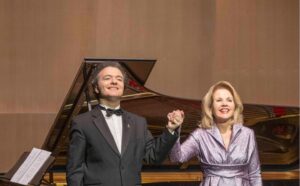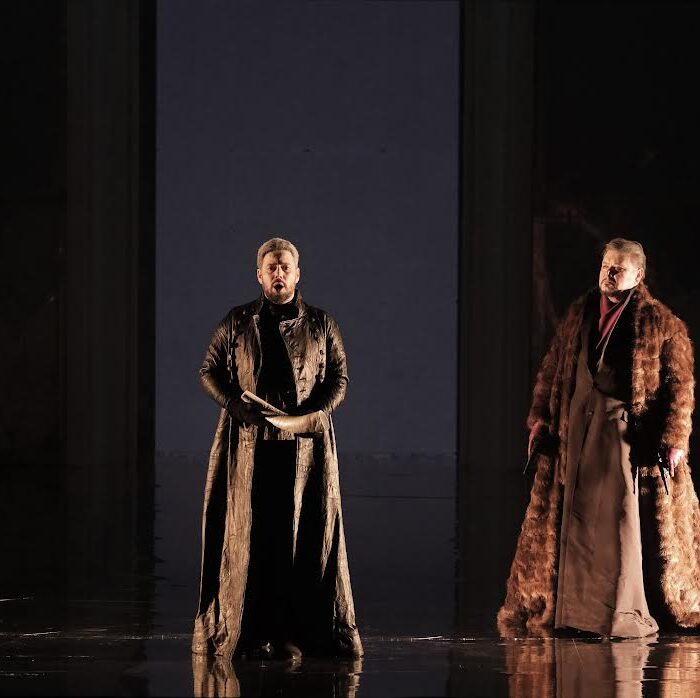
Salzburg Festival Recital 2023 Review: Renée Fleming & Evgeny Kissin in Recital
By João Marcos CopertinoPhoto credit: SF/Marco Borell
This was a fancy recital: Renée Fleming and Evgeny Kissin. The audience was also the “who’s who” of classical music. Just behind me, Cecilia Bartoli is seated with her mother, the emerita Silvana Bazzoni. Not far away, Jeanine De Bique and Sabine Devieilhe. Other non-operatic essential names pop all from the balconies. They all came to be amazed by two of the most celebrated artists of our time. In such a great recital, a critic’s task is hard. But, not vague. What is it that makes Fleming and Kissin so special?
The American Diva
Renée Fleming has exquisite language skills. Salzburgians often comment how beautiful her German is. However, sometimes she softens her French and Italian consonants too much. In her Lizst’s “Oh quand je dors,” for example, her shy “r” in “Laura” made Petrarch’s lover “Lola.” For more than a few years, I have perhaps been unfair to her because of that. In fact, after this Lieder recital, I can see that I was complaining about the cracks in a Bellini “Madonna.” Fleming has a skill of making language more beautiful precisely by compromising textual understanding in the name of an elaborated musical subtext. I will explain, I promise.
For opera lovers, perhaps the most famous essay of Roland Barthes conceptualizes what he calls “The Grain of the Voice.” Although the essay is notorious for its criticism of the almighty Dietrich Fischer-Dieskau, it is also notable for Barthes’s stress on how important old-school pronunciation is for the transmission of the text. Tonight, however, Fleming may have proven him wrong.
The American Diva, in the best sense of the phrase, is less concerned with textual comprehensibility because, when she sings, she is uncovering a musical subtext that transmits meaning without words. It is an instrumental approach to singing that maximizes expression precisely in order to enjoy the abstract, but not arbitrary, nature of musical sounds.
In fact, I certainly enjoyed it even more when Fleming sang in languages in which I could not grasp the words. When she sang Rachmaninoff’s “The Dream,” I had the impression that her voice had grown larger, better. I could not have been more pleased to find, after the song was over and I read the translation, that the text had already been there for me. The message was transmitted, without words. There, lies the power of Fleming’s artistry.
Illuminating Moments Together
It also helps that Fleming’s accompanist was Evgeny Kissin. He is quite likely one of the most well-regarded pianists of Rachmaninoff, of all time. It is interesting to see such a star, in the piano repertoire, play with a soprano. Kissin is not a typical performer of Lieder. His piano is interrogative and more than supporting the singer. He poses questions and expects the vocalist to answer them in their own time, and surprise him. This level of musical conversation often exposes the singer more than is usual. Luckily, Fleming is more than up for the game.
In Richard Strauss’s “Morgen,” for example, Kissin was in no rush as he played the piano phrases. Indeed, his pauses were long fermatas that made his questions more complex. Fleming entered with the longest of legatos, enjoying the piano like someone looking out on unpredictable waves at the beach. When they reached the final phrases together, the dialogue reached its synthesis with the most piano and languid tenuto. It was beautiful.
The Final Journey
In addition to this beauty, there were some minor issues. The recital started with a few Schubert songs that were well-performed, but they were not as remarkable as the Rachmaninoff and Liszt songs. Also, on a personal note, I am not extremely found of the acoustics of the House for Mozart for song recitals. The room is a showbox opera house with well-suited acoustics for orchestras. I understand that Fleming and Kissin are both two big names that get to perform in the cozy Mozarteum Haus, but why not the Great Festival Hall or the Felsenreitschule. Both are just as big and in the same building complex.
Small issues aside, I am really saddened to learn that this was the last concert in which Kissin and Fleming will play this repertoire. They are really a remarkable duo and I hope to see them together more often.


